MACON, Ga. — If you scroll through social media, you may see some new posts from the Bibb County Sheriff's Office.
Some of them will show people getting arrested. Some users in the comments section questioned whether it's the right choice to show people in those moments. Others asked if it was even legal. We took those questions to Sheriff David Davis, and an expert in the field.
Davis says the goal of the posts is to show folks in Macon-Bibb County they're taking care of complaints people have.
"All of this posting of arrested individuals began when we were getting questions, community questions about, 'Sheriff's office, what are you doing?'" he said.
Davis says they're keeping Macon-Bibb safe. He says the posts are proof.
"What our hardworking deputies are out there doing every day, protecting our community, and we've noticed that there are other agencies now doing similar posts," he continued.
Some commenters criticized the sheriff's office, asking why they keep posting the images. One recent post showed a woman crying after being arrested for street racing. In the original picture, just the logo on her shirt was blurred. People asked why they didn't blur her face, too.
"It may have been a logo, some kind of business. Or it might have been something that may have been something that you don't want to see online," Davis said. "There's no law that prevents that."
Richard Griffiths is President Emeritus of the Georgia First Amendment Foundation. He also devotes his time to studying media ethics. Griffiths says there could be a gray area if there's not an easy way for people in the pictures to get them taken down.
"Of those who were found innocent after their cases have gone to the district attorney, and charges dropped," he explained.
Griffiths says he sees the benefits of the posts, but questions whether the 'public shaming' aspect is a fair punishment for the alleged crimes. He compares it to the stockades in the 1700s.
"The digital equivalent of throwing rotten cabbages and rotten tomatoes at people," he said. "This is a very nuanced thing. Very complicated."
Griffiths added cases like this are brand-new in media ethics and law. He says he could see a situation like this going to court.
Sheriff Davis says arrest reports are public record, and argues the posts, and pictures, are too. He says it's a different case from mugshots. State law requires them to be taken off the internet without cost if someone acquitted requests it.
13WMAZ also has a policy when it comes to sharing mugshots. We have strict guidelines of what crimes we'll publish them for. We would share a mugshot of someone accused of a violent crime, or of a public official who's been arrested. Each time we do publish one, our news team carefully considers what it adds to the story before posting it or using it on air.

